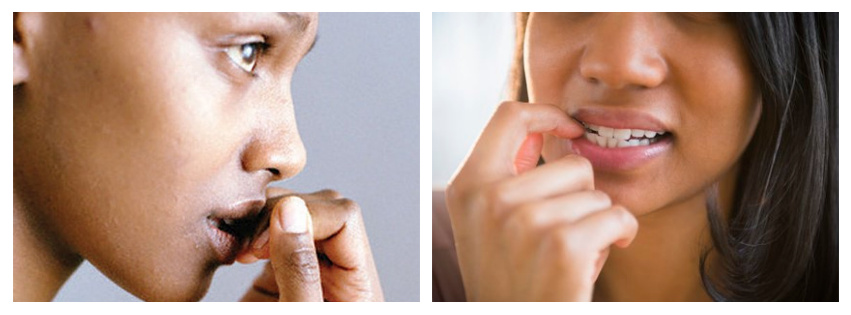Turns out your unsightly nails aren’t the worst of your problems. Nail-biting can actually lead to a few other health issues, says Robin Evans, MD, a board-certified dermatologist at Southern Connecticut Dermatology and a clinical instructor at the Albert Einstein College of Medicine in New York City.
The main issue? Nail-biting can remove so much of the nail that it can actually increase the risk of developing cuticle and inflammatory infections like paronychia (a bacterial or fungal infection). Also, if you bite your nails so short that you actually draw blood (yes, that happens), it can open up your skin to other viruses like warts and even yeast infections. And if you bite your nails for a long enough time, you can eventually affect the nail matrix, which can cause permanently misshapen nails, says Susan Bard, MD, a board-certified dermatologist at Vive Dermatology Surgery and Aesthetics in New York City.
All of that, of course, is in addition to nail-biting being super unsanitary. Not only can you transfer infection from your dirty hands into your mouth but you can also transfer infections from your mouth to your hands, Bard says.
Basically, nail-biting isn’t a great idea. But what if you just. can’t. stop. biting? You’re not totally SOL or doomed to a future of misshapen nails. Try these nail-saving techniques on for size.
1. Buy some nail polish that makes you cringe.
No, I don’t mean a shade of puke-green-for mindless munchers, OTC products that have a foul taste can be enough to break the habit, Chris G. Adigun, M.D., a board-certified dermatologist and a nail specialist in Chapel Hill, North Carolina.
These clear polishes have a bitter (but ultimately harmless) taste-and they’ll certainly make you aware of your nail-biting if you tend to do it without realizing it. After all, if you dont even realize youre doing it, this will certainly make you aware.
2. Go ahead and spring for a real manicure.
Listen, I’m not going to knock your DIY manis, but according to the The American Academy of Dermatology, a pricey and pretty reminder on your nails may be enough to ditch the habit. It makes sense: If your nails are done up-and you just doled out some dough to have them done-you might be less likely to want to ruin the work.
3. Know your triggers-and how to avoid them.
If youre a nervous nail biter, identify when and where your tension crops up, says Kieron OConnor, Ph.D., director of the obsessive-compulsive disorder (OCD) spectrum study center at the University of Montreal.
For example, maybe you notice that when youre on a tight deadline, you feel the need to do something with your hands-and then your nails turn to stubs. Knowing that, and coming up with what OConnor calls a competing action (like putting your hands on your knees instead of in your mouth when you feel anxious ) can help you change your response to stress. Other relaxation strategies like deep breathing can help, too. Make your deadline without biting? Reward yourself, suggests OConnor-just not with a nail-biting sesh.
4. Don’t be so hard on yourself.
Nail biters tend to be perfectionists, says OConnor. But pushing yourself too hard can lead you to feel like youre never doing enough (even if you are). These type of situations trigger nail biting, he notes.
Sound familiar? Take stock of your expectations. Maybe youre setting goals for yourself that are too unrealistic to ever meet, or maybe youre not giving yourself enough credit. Then think: Whats a challenging but attainable goal? How am I performing compared to other people in my position? The aim here is to prevent the nail biting in the first place by addressing the thoughts and emotions that cause it, says OConnor.
5. Try taking a special supplement.
If bad-tasting polish isnt your jam, N-acetyl cysteine (NAC), an over-the-counter supplement, can be helpful in kicking the nail biting habit, Bard says. She points to a 2013 study in the journal Anti-Inflammatory & Anti-Allergy Agents in Medicinal Chemistry that found NAC can decrease nail-biting behavior in children and adolescents-likely because NAC plays a role in regulating the body’s reward and reinforcement system.
Bard suggests trying Puritan’s Pride 600-milligram capsules , taken as directed on the bottle for a few weeks to see if you notice any differences in your nail-biting routine.
6. Swap it out for a better habit
One way to work on breaking this habit is to be consciously aware of when youre doing it, rather than zoning out and doing it absentmindedly. Then, switch to another behavior, such as sitting on your hands, chewing gum, or sucking on lozenges or mints, Evans says.
Something important to keep in mind, though: It takes about three weeks to break a habit and form a new one, says Bard, so it’s important not to give up too soon.
7. Talk to someone about it (yes, really).
Sometimes, you just cant stop. If you have medical complications from biting-or if your habit is linked to psychological issues like anxiety disorders (or you think it could be)-a mental health professional can provide the support you need, says Adigun. So if you think your biting is obstructing day-to-day life, make an appointment. There are many professionals who specialize in conditions like OCD and anxiety who can help quell your worries-and hopefully help you cut the habit for good.
